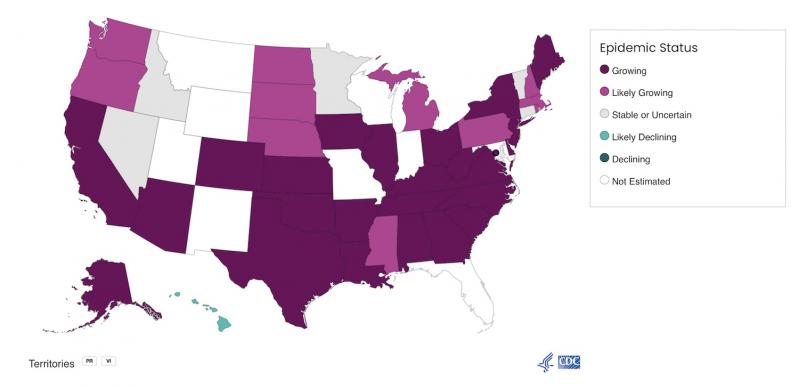Covid infections are on the rise again, according to the federal Centers for Disease Control, and doctors and medical professionals here are urging people to remember the lessons learned during the pandemic to keep themselves healthy.
Dr. George Dempsey, medical director of East Hampton Family Medicine, said he believes that people are not taking the current rise in cases seriously.
According to the C.D.C., infections were either growing or likely growing in 36 states and territories, including New York, as of July 23. While more people seem to be getting Covid, the number of people hospitalized for it at Stony Brook Southampton Hospital has remained low, at an average of just one to two cases at a time in recent weeks, according to a hospital spokesperson.
“It’s not that this time it’s weaker,” Dr. Dempsey said. “It’s that we’re vaccinated, so it’s less severe. The virus is still invasive and damaging to the heart, the lungs, the kidney, and the brain. The consequences have not changed. It’s still the same virus, and we are still the same humans. It’s a shame that we need to keep justifying these basic safety precautions.”
“Clearly, overwhelmingly, vaccinations reduce the risk of long Covid and other complications,” Dr. Dempsey said. “The risk of the vaccine is minuscule and rare.” Dr. Dempsey noted that every vaccine, such as the measles vaccine, the polio vaccines, and even the flu vaccine has side effects. “Unvaccinated people are five times more likely to have long Covid.”
His recommendation: “Get the booster. The strains change. The boosters adjust to the later strain.” And, he said, there is a relation between “the increased number of boosters and decreased long-term effects of Covid.”
Dr. Cynthia Friedman, director of public health for the Suffolk County Department of Health Services, agreed. “Most people with Covid, especially if they have been vaccinated or have had Covid before, will show minor symptoms,” Dr. Friedman said.
“I see the people with immune compromise are taking it more seriously, and the ones with strong immune systems are saying, ‘let me challenge it,’ ” said Dr. Asma Rashid of Hamptons Boutique Medicine in Bridgehampton. “However, there is nothing that will tell us whether we will fight it well or we won’t. I had a patient and with the variant she caught, she had a fever, a rash, and was quite sick. However, she had gotten it earlier in other years and was fine.”
There’s a “fear factor” with Covid that people are ready to be free of, said Dr. Rashid said. “I feel like from a medical standpoint, patients just don’t want to be with this medical agenda anymore.” Despite all the data pointing people toward boosters “because the vaccine is catching up to the different variants, not many people are up for a booster unless they have an immune compromise,” Dr. Rashid said.
“For the sake of those more vulnerable to the virus, we advise everyone to pursue treatments to reduce further Covid complications,” Dr. Friedman said. “We treat Covid more like any respiratory virus at this point.”
Paxlovid and other treatments for Covid need to be started as soon as possible to be effective,” Dr. Friedman said. “Everyone should talk to their doctor about treatments, especially if they are at risk.” Paxlovid, an oral medication, has a standard dose of three pills twice a day, according to Yale Medicine. Dr. Rashid said that with Paxlovid, there is a patient-per-patient variation. “I’ve had to double up Paxlovid in some cases because there is a rebound effect. Sometimes five days is not enough, but most patients decrease the viral load and replication after a few days.”
“We are most concerned about the vulnerable population from a public health standpoint. For example, nursing or assisted living populations are a cause for concern,” Dr. Friedman said. “Think about people in your personal life and work life who might be at an elevated risk and take the necessary precautions to keep them safe.”
Dr. Friedman said if you have Covid-like symptoms, you should test yourself and delay visiting elderly friends and family until you feel better. She also suggested basic precautions such as limiting indoor gatherings as much as possible and wearing a mask if it’s necessary to be in a crowded indoor area. When feasible, Dr. Friedman advises moving large events to an outdoor venue.
“As humans, we aren’t computers, and we can’t compute risk,” Dr. Dempsey said. “Instead, we react to our immediate concerns and our immediate exposure, which is understandable as people, but we are not good at understanding risk. My advice is to be considerate of others. If you’re willing to take the risk, that’s fine. But don’t expose others.”
“At the end of the day,” Dr. Rashid said, “Just be a responsible person.”

